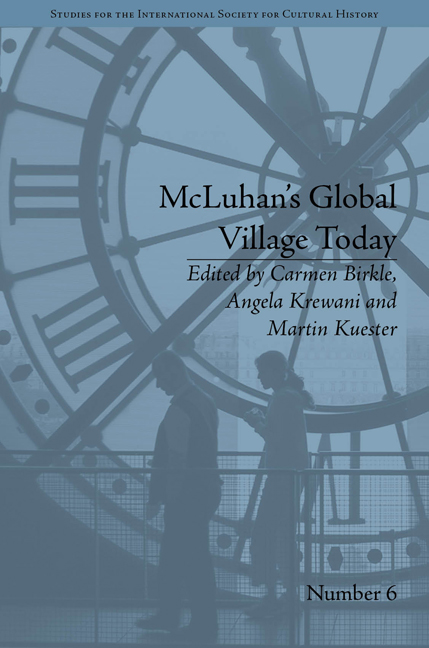Book contents
- Frontmatter
- CONTENTS
- List of Contributors
- List of Figures
- McLuhan's Global Village Today: An Introduction
- Part I McLuhan and Media Theory
- Part II McLuhan and Literature
- Part III McLuhan and Technical Media
- 11 Radio Voices: Reflections on McLuhan's Tribal Drum
- 12 McLuhan's Paradigms and Schafer's ‘Soundscape’: Parallels, Influences, Envelopes, Shifts
- 13 Literary Modernists, Canadian Moviegoers and the New Yorker Lobby: Reframing McLuhan in Annie Hall
- 14 The Animated Medium is the Animated Message (?): Reading Animated Moving Pictures with Marshall McLuhan
- 15 Marshall McLuhan and the Emergence of American Television Theory
- 16 ‘The Medium in Your Pocket’: A McLuhanian Approach to New Media
- Notes
- Index
12 - McLuhan's Paradigms and Schafer's ‘Soundscape’: Parallels, Influences, Envelopes, Shifts
from Part III - McLuhan and Technical Media
- Frontmatter
- CONTENTS
- List of Contributors
- List of Figures
- McLuhan's Global Village Today: An Introduction
- Part I McLuhan and Media Theory
- Part II McLuhan and Literature
- Part III McLuhan and Technical Media
- 11 Radio Voices: Reflections on McLuhan's Tribal Drum
- 12 McLuhan's Paradigms and Schafer's ‘Soundscape’: Parallels, Influences, Envelopes, Shifts
- 13 Literary Modernists, Canadian Moviegoers and the New Yorker Lobby: Reframing McLuhan in Annie Hall
- 14 The Animated Medium is the Animated Message (?): Reading Animated Moving Pictures with Marshall McLuhan
- 15 Marshall McLuhan and the Emergence of American Television Theory
- 16 ‘The Medium in Your Pocket’: A McLuhanian Approach to New Media
- Notes
- Index
Summary
Introduction to Schafer's Concepts
In a publication about McLuhan nobody needs to point out the protagonist's significance. However, one cannot presume that everybody knows about the significance of the Canadian sound pedagogue, researcher and composer R. Murray Schafer and his idea of ‘soundscape’ and ‘acoustic ecology’. Up to the present day, the latter has been one of the very few consistent theories on sound in the most comprehensive meaning of the word. Schafer built up a consistent terminology through which listening as well as auditory phenomena are clearly rooted in a critical approach to societies and their values, as well as their technological, economic and cultural phenomena. Schafer's terminological framework has changed the general notion of sound from being amorphous – and therefore beyond a scientific and scholarly approach – to providing an order to sonic phenomena together with an order of auditory perceptions.
In his major work The Tuning of the World, which appeared in 1977, Schafer unfolded a cultural history of listening, by identifying the changes and dynamics by which the significance of listening in occidental societies since ancient times has been defined and altered. As driving forces behind this development, Schafer named Gutenberg's movable type and its consequences: rationalism, mechanization and the era of Enlightenment.
- Type
- Chapter
- Information
- McLuhan's Global Village TodayTransatlantic Perspectives, pp. 131 - 144Publisher: Pickering & ChattoFirst published in: 2014



